The teacher's command of his class is total. "Which one is the whole number?" he asks crisply. "Is it seven over three, or is it four?"
He zeroes in on a child who gives the right answer, then the next task: "Seven over three divided by four over one? Hands, please – I'm looking for straight arms."
The classes at Sci Academy, a charter school in New Orleans, feel like an assembly line; with each task stripped down to component parts, and the teacher orchestrating a brisk interaction that draws in students' bodies as well as their minds. They click fingers as a substitute for applause, or to show understanding, and sit poised to attention as the teacher moves around the room.
New Orleans is a city that has been failed by government in the past, most tragically when Katrina struck. But one consequence of that disaster has been a root-and-branch transformation of its education system.
The reforms had begun before Katrina, but the pace was accelerated after the disaster. It is now the only US city where a majority of public school pupils – around eight in ten – attend charter schools, which are non-unionised and enjoy a rare degree of operational independence from government.
This academic year brings further change; under reforms brought in by Republican governor Bobby Jindal, poorer students attending poorly performing state schools can apply for vouchers to cover their fees at a private or religious school. Nearly 5,000 students in Louisiana have taken up the voucher programme, making it one of the most popular such initiatives nationally. Similar experiments are underway in several other states including Indiana and Ohio.
The creation of a fully-fledged market in education is endorsed by Mitt Romney. If elected, the Republican candidate would provide $25bn in federal money to back school voucher systems.
In education, as in health, vouchers are a dividing line between the parties. President Obama has embraced charter schools and increased accountability for teachers, but stops short of letting public money follow children to private schools.
The pale blue corridors of Sci Academy, housed in a cluster of prefabricated blocks in New Orleans East, are lined with inspirational mottoes: "Chase perfection, catch excellence," reads one. Another declares: "We're never done, we're never finished".
The words are directed at students, but could apply just as well to the teachers, who are evaluated on each lesson. Staff here are regularly observed and receive constant feedback on their performance. Closer scrutiny of teachers – particularly the linking of evaluation to standardised test results – has been controversial nationally; it was one of the issues at stake in the Chicago teachers' strike.
The goal in New Orleans is to reverse years of educational decline. Before Katrina, state schools here had become starkly segregated on race and class lines as white and middle class families removed their children.
By 2004 one in three New Orleans students was at a private or religious school, compared with a national average of 11%. In high school exit exams that year, 96% of the city's public school students were below basic proficiency in English.
In the years since Katrina, student performance in tests has improved, and fewer students now go to failing schools. Students have achieved a higher average score in the ACT test, which measures readiness for college.
A study by the Cowen Institute at Tulane University notes the improvement, but is cautious about the reasons why. Many claims have been put forward "but few have been proven by the available data," it says.
John White, Louisiana's state superintendent of education, argues that decentralisation has freed schools to act in children's best interests. Charter schools, state-funded but independently run by non-profit groups, are now the norm in New Orleans. In the past school year, 78% of public school students were enrolled in charters. The proportion will rise this year. Such schools enjoy great flexibility in managing their time and allocating resources.
White said: "A lot of this is about ensuring that parents don't leave. It's really not the state that is the best vehicle for keeping parents in our schools, it's the schools, and how do you do that? You create a policy environment where choice is the norm, where schools have the freedom to improve and retain parents. We have a choice and competition model, where schools are competing for the interest of parents."
In the New Orleans school market, where parents are purchasers and schools tout for custom, the state's role is increasingly to act as a regulator rather than a provider of services.
In an attempt to ensure that schools don't game the system, a unified system of enrolment has been introduced for the whole city, with places at oversubscribed schools decided by lottery rather than how close the family lives. Schools must abide by the same rules on exclusions. A network of school buses provides transport, enabling families to choose a school distant from their home.
Parents are motivated by a range of inducements, not just a school's academic achievement. Ava Lee, director of the Samuel J Green charter school, says some are attracted to the extended school day, in which children are offered a range of sporting and cultural activities from flag football to African dance. Others appreciate the school's healthy eating ethos; it has an "edible schoolyard" growing aubergines, kale, chillies and strawberries. Learning how to cook and eat healthily is on the curriculum here.
Lee said: "Schools receive a report card now, parents are savvy – they research online and see how a school is performing. It's no longer the neighbourhood school; it's really parent choice."
The most controversial aspect of the Louisiana reforms is the extension of school choice outside the public system. A pilot voucher programme has existed in New Orleans since 2008, but has been expanded statewide under measures signed into law by Governor Jindal in April. Unlike the pilot, the new programme is open to children from kindergarten to 12th grade. Places at private schools are assigned by lottery and the state voucher covers tuition fees.
The new programme
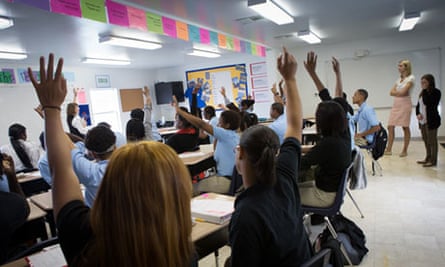
Jack Loup, founder of the Coalition for Louisiana Public Education, argues that there is no evidence to support the view that private schools are better.
"They [private schools] have never taken any tests. I went to a parochial [church] school. I certainly have nothing against them. But they don't take any tests to prove they are doing better than other schools. All they have done is throw it out there, saying parents know what's best for their child – parents have no idea how well the school is teaching their child."
The initiative has meant a significant boost to the enrolment of schools like the Life of Christ Christian Academy, a non-denominational religious school in New Orleans. The school, a neat brick cube in a neighbourhood of pastel-coloured shotgun houses, is now "75% vouchers", according to its principal and owner Cheryl Leufroy Frilot.
She acknowledged that the religious setting is uncomfortable for some, but said her small class sizes and relaxed teaching style are attractive to many parents. The annual cost of tuition is around $6,000 for this academic year.
Frilot said: "It's a free place – they can come and be who they are. Its not robotic, not military-oriented."
Many parents are drawn to the moral values she instils, Frilot said, as well as valuing her "no-nonsense" reputation. "What they say is: if your child's having problems, take them to Miss Frilot."
Religious education here takes the form of a Bible studies class rather than comparative faith, but science is never censored, Frilot said. "We teach evolution, we teach reproduction. I'm not saying [religion] is the only way."
Private schools that accept the vouchers must enter those students for the same standardised tests taken by public schools. If they fail to reach the bar set for state schools, they face removal from the programme.
In Louisiana, the state sets clear limits on the marketplace. In the end, accountability to its testing regime trumps choice: the government will close a chronically underperforming public school even if parents continue to choose it.
Neerav Kingsland, chief strategy officer of the not-for-profit group New Schools for New Orleans, likens it to licensing restaurants.
"If a restaurant is violating health codes, even if people want to go there, we're going to close the restaurant. If some schools are performing so bad on tests, even if parents want to got there it's a civic duty to close that option."
Granting schools greater autonomy is regarded as vital to the health of the system. Freeing schools from central control – chiefly by setting up charters – has been a hallmark of education reform in the US, embraced by the leaders of both parties.
With this freedom comes the latitude to tailor a bespoke approach to complex problems, White said.
"We have a school in the ninth ward where the principal has decided that he's going to serve breakfast, lunch and dinner to each child. He and I worked together in New York; we were joking about what would happen if we tried to do that in the New York City system.
"Not only would the teacher union say it was a violation of contract, but the food service would say: 'We don't do dinner'. Security would say: 'Yes, but we have to pay for the per diem', the electricity company would say: 'No, we shut school buildings down at this hour.' My point is that when you run systems on a basis where you have these monolithic contracts, they almost by their nature ignore the complexities of schools."
In common with conservative education reforms across the US, New Orleans schools have come under increased competitive pressure while facing tight spending settlements.
In particular, the Recovery School District – a group of underperforming Louisiana schools which have been taken over by the state government – is making "significant cuts" in expenditure, according to the Cowen Institute.
Loup, of the Coalition for Louisiana Public Education, said: "The money the state provides to our school system has not been increased in four years. That increase is what allows the school system to handle the increasing costs that we receive every year, for retirement, for healthcare, for the gas that goes on the bus. That's the biggest thing that's holding our school system back.
"Every time you take that money away, it's taking away programmes that help those who need it the most. It means the schools are not going to do well, they'll have lower scores, it makes us look like we're not doing our job."
Even before Katrina, the quality of infrastructure in New Orleans was poor. Its roads, built on swampy ground and poorly maintained, are often bumpy and potholed. The officials behind its school reforms say one of their concerns is to deal with a gap the government can fix; the supply of skilled workers.
Raising standards in schools means more jobs in sectors like oil and gas, a mainstay of the state's economy, can be filled by local people. Patrick Dobard, superintendent of the Recovery school district, said: "As a state we have a number of chemical plants and what we're finding is that requirements in plant operators have changed dramatically over the last ten or 15 years, where you really need a couple of years of community college or two years of four-year college to perform at the level they need to have for workers, so there's a dire need in the industry to have higher performing workers.
"That's why we're trying to ensure we have strong technical education in our schools."
The public school system in New Orleans remains skewed by race and income compared with the city it serves. In the academic year 2011-12, 90% of students in New Orleans public schools were African American and 85% were on free or reduced lunches, an indicator of poverty. The US census says 60% of the city population is black and 24% are classified as poor.
The US census says
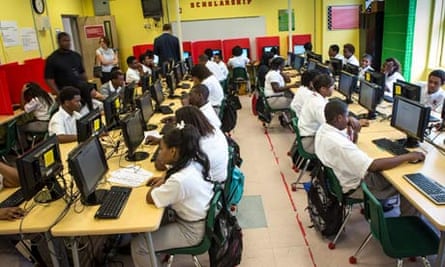
Meanwhile, those at the forefront of change are often white, prompting accusations that this is a reform imposed by outsiders. Since the charter school programme was accelerated in the wake of Katrina, the profile of school staff has changed; it has become whiter and younger. White, the state superintendent, acknowledges the change – around half of school leaders are now white, he says. He said: "Its not far from the demographic of the city itself which has also changed. It's over a third white."
The concentration of African American children in New Orleans schools dates back to desegregation; white flight created entirely black schools in the inner city, and largely white ones in the suburbs. Joseph S Clark prepatory school – better known as Clark Prep – was, before desegregation, a highly performing black school.
But when it was taken over by charter operator FirstLine Schools, it had become a "school of last resort," according to co-principal Alex Hochron.
He said: "The year before FirstLine took over in 2010, Clark was the lowest-performing high school in the whole of Louisiana. When we walked in here, spray-painted up one of the banisters was the word 'graveyard'. [We said] did someone do this because we're taking over the school? The response was: that's been up there for months.
"There was very little authority. There were fires being set in the bathrooms. I'm not saying the adults weren't working, but there wasn't a sense of consistency and support."
The change in two years is evident to the students, who come up unprompted to tell outsiders of their pride in the school. One student, Henrietta London, said: "This school used to be a mess; children were learning nothing. My mum sent me here because they're rebuilding the school and changing the culture."
The school ran a poster campaign this year aimed at recruiting new parents. One poster showed faces from the class of 2012, highlighting how many had been accepted into college. Another featured a star student in his basketball gear, asking: "What will be your legacy?"
Jay Altman, chief executive of FirstLine Schools, dismisses the idea that the competition for students discourages schools from sharing knowledge.
"Even though hospitals in this country are competing with each other and patients have relative choice, medicine has some of the best knowledge sharing in the world," he pointed out. "Those of us who are trying to close the [education] achievement gap nationally, we share practices all the time."
The future in Louisiana is one in which the competitive pressures will only get more intense. The state estimates that 380,000 schoolchildren, out of 700,000 statewide, are eligible for the voucher scheme. Charter schools, introduced in many other cities as competition to traditional public schools, are themselves facing the prospect of pupils being poached.
The language of the marketplace pervades the conversation about schools here. When the architects of school reform in Louisiana speak about the public school system, it is reminiscent of a private equity firm casting a hawkish eye over a mediocre business they have just bought.
White is uncompromising about the virtues of choice, even if that means weak schools being driven to the wall. "I think competition is always to some degree destabilising to those who can't compete," he said. "I have no problem with a school that is failing parents and kids being essentially destabilised because parents aren't choosing it."'
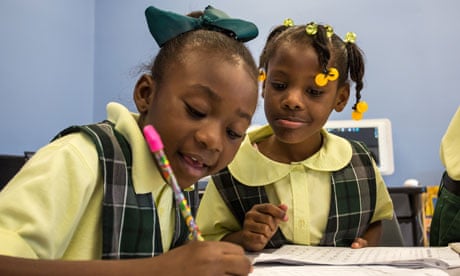

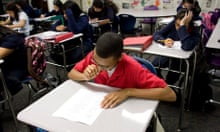
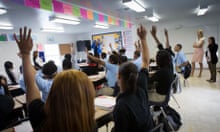
Comments (…)
Sign in or create your Guardian account to join the discussion